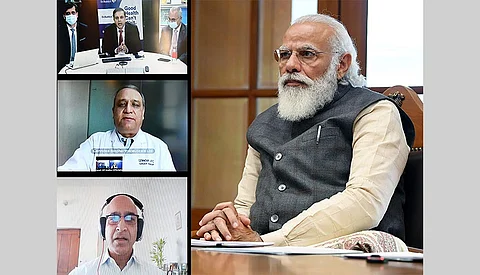
- Home
- About
- Globally Speaking
- Videos
- Podcast
- Geopolitics
- Industry
- SIGN UP

The Indian Prime Minister has committed to supply vaccines not only to the Indian population but also to neighbouring countries and the world at large. This contrasts with the approach of rich countries that are intent on buying up vaccine supplies for their own populations only.
Unlike many previous Indian Prime Ministers and their governments, Narendra Modi's governance mantra has a distinctly Indian idiom. This is clearly evident in his government's approach to the Covid crisis that has brought even some of the most developed nations in the world to their knees.
India considers vaccines as not only vital to good health but also a global good. It is India's duty to assist other countries, including in our neighbourhood, in the collective fight against the virus. Modi has declared.
Have you read
Unlike many previous Indian Prime Ministers and their governments, Narendra Modi's governance mantra has a distinctly Indian idiom. This is clearly evident in his government's approach to the Covid crisis that has brought even some of the most developed nations in the world to their knees.
Even as three Indian companies are at various stages of testing indigenously developed and licensed vaccines to fight the Covid-19 virus, he declared, following his visit to the Zydus Biotech Park in Ahmedabad, Bharat Biotech in Hyderabad and the Serum Institute of India in Pune on November 28: “India considers vaccines as not only vital to good health but also a global good. It is India's duty to assist other countries, including in our neighbourhood, in the collective fight against the virus.”
The US and EU have stymied a proposal by a India to waive some sections of the WTO's rules on IPR to enable millions of poor people in poor countries to get shots of the vaccine.
This is in keeping with the ancient Indian philosophy of Vasudeva Kutumbakam (The entire world is my family). The three companies are at the forefront of India's efforts to expeditiously bring a medically proven and widely affordable vaccine to the market.
It's also a very daring and bold decision, considering that India has 1.3 billion people waiting anxiously for their shot of vaccine. It stands out in stark contrast to the strategy of most other countries to corner the global stock of vaccines for their own citizens. The US government has made no secret of its intentions of buying up vaccine supplies from all available sources for its own population, while Russia, which is developing the Sputnik vaccine, has adopted a pay-if-you-want-the-vaccine approach.
Meanwhile, the US and the European Union, which are the home bases of the world's leading pharmaceutical companies, have stymied a proposal by India and South Africa to waive some sections of the World Trade Organization's rules on intellectual property to enable millions of poor people in less developed parts of the world to get shots of the vaccine.
A recent meeting of all 164 member-countries of the WTO ended without a consensus on the issue. This may lead to a situation where only citizens of rich countries get the vaccine developed by the likes of Pfizer and BioNTech, Moderna and AstraZeneca. In fact, several developed nations that have decided to buy up stocks of the vaccine whenever it is available to treat only their own populations.

That is what makes Modi's diplomatic initiative to make the Covid-19 vaccine available to neighbouring countries all the more commendable.
Meanwhile, India pharmaceutical major Zydus Cadila's ZyCov, which entered the Phase 3 final stage of clinical trials this month, may be ready for launch by march. The company is simultaneously developing a second vaccine and expects to have its pre-clinical data ready by next month.
Besides, Bharat Biotech's indigenous vaccine Covaxin and a vaccine licensed to the Serum Institute of India by AstraZeneca and Oxford University are also currently undergoing the final phase of clinical trials in India.
With a combined production capacity of about three billion doses, the Indian drug industry is well placed to give wings to Modi's diplomatic and humanitarian outreach to all its neighbours and the developing world at large.
Asserting this, India's External Affairs Minister S. Jaishankar said: “Prime Minister Modi has committed to the UN that we will help make vaccines accessible and affordable to all. From the regular conversations I have had with so many counterparts, the world is counting on us to do so.”
Modi is quite clearly emerging from the Covid-19 crisis not with a burnished image as an able administrator but also as a global statesman.